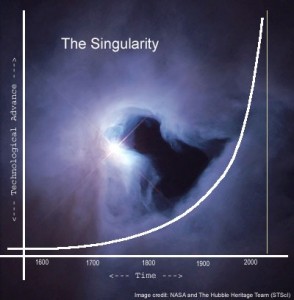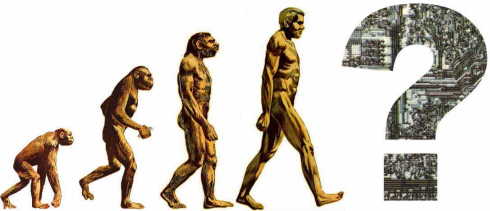 The much mythologized Singularity which is said to be near by transhumanists is the point in time when artificial intelligence surpasses human intelligence prompting the exponential curve of technological growth to go vertical. The growth will be so rapid as to supersede our current abilities of imagination. You see, Ray Kurzweil and other transhumanists believe that through modeling the human brain artificial intelligence will become conscious. In fact, he goes so far as to argue that machines will have spiritual experiences and will even worship:
The much mythologized Singularity which is said to be near by transhumanists is the point in time when artificial intelligence surpasses human intelligence prompting the exponential curve of technological growth to go vertical. The growth will be so rapid as to supersede our current abilities of imagination. You see, Ray Kurzweil and other transhumanists believe that through modeling the human brain artificial intelligence will become conscious. In fact, he goes so far as to argue that machines will have spiritual experiences and will even worship:
Twenty‐first‐century machines—based on the design of human thinking—will do as their human progenitors have done—going to real and virtual houses of worship, meditating, praying, and transcending—to connect with their spiritual dimension. [1]
While one marvels at what precisely he thinks they would worship, he seems to intuitively acknowledge that consciousness entails a sense of the divine. While many may suppress the truth, people know in their hearts that God exists. God wired us to seek him. Solomon said it this way:
He has made everything beautiful in its time. Also, he has put eternity into man’s heart, yet so that he cannot find out what God has done from the beginning to the end (Ec 3:11).
Kurzweil has been challenged by John Searle the distinguished philosopher at the University of California at Berkeley. Searle has criticized the view that AI can become conscious with his “Chinese Room” argument which holds that software cannot give a machine a mind or true understanding, regardless of how cleverly it behaves. Kurzweil responded to this argument in the last chapter of The Singularity is Near with some sound counter-arguments. While the debate is interesting, ultimately they are both wrong because they are arguing from a naturalistic worldview.
The scientific paradigm of materialism reduces humanity to a byproduct of chemistry and physics. But if my thoughts are merely chemical reactions, then I would have no good reason to believe they are true. Atoms and chemical reactions just do not discern truth. In this way, scientism (the belief that science is the only way to know truth) is self-defeating. The atheistic material reductionist view of consciousness is that it is an emergent property of the brain. This is the dominant scientific view point. For instance, even Kurzweil’s critic Searle has written:
The brain is a machine, a biological machine to be sure, but a machine all the same. So the first step is to figure out how the brain does it and then build an artificial machine that has an equally effective mechanism for causing consciousness. We know that brains cause consciousness with specific biological mechanisms.[2]
The understanding about consciousness in the case of artificial intelligence is that consciousness will arise from the material structure of electronic hardware as an emergent property. Emergent properties are seen from a bottom up approach.
An emergent property is a property that emerges from a certain organization of matter. For instance, the taste of salt or saltiness is an emergent property of sodium and chloride when combined as NaCl or common salt. In this case, on the bottom we have subatomic particles forming sodium and chlorine atoms and then on the next level the matrix of atoms causes the property of saltiness to manifest. It is important to note that saltiness is an effect of the matter. Salty taste doesn’t change the salt. It is simply the property that emerges as an effect when the salt molecules come together. The matter is a cause and the emergent property is an effect.
Given the naturalistic worldview, spirituality and consciousness are merely functions of the brain. If that is the case, then consciousness is also on the top not on the bottom. Therefore it’s an effect not a cause. Accordingly, consciousness doesn’t cause things. It’s simply the effect of fatty tissues, neurons and information. In the case of AI it is just a physical thing, computer hardware, programmed with software that allegedly produces consciousness. If the computer is producing consciousness, then consciousness is similarly an effect.
The problem is that consciousness is seen as the result of a purely material process. Being the effect it cannot also be the cause. If it is not a cause, then it does not make decisions or choices. Yet, the problem with that is, it seems that mental states do cause things. Think of it this way, you need legs to walk, but you’d never say that your legs are walking. Another major problem with this is willful actions. It seems to me that I will something in my mind and then my body acts. In fact, I can imagine events in my mind that never physically occur at all. It seems to me that conscious beings do make choices. We do think about things and decide between alternate ideas and exercise rationality. This is what consciousness really means. Computers may mimic consciousness but they will never really achieve it.
Kurzweil’s dream of the Age of Spiritual Machines is logically incoherent. His point of view doesn’t leave room for a soul that is a thing in itself with mental properties, but that mental properties are merely the effects of the physical thing itself. The Christian view is that man is made up of two distinct substances: an immaterial substance (mind) and a material substance (body). It is a top down approach in which you are not your body rather an eternal immaterial being that is having a temporal material experience. Evidence is mounting for this reality in the area of Near Death Experiences. Look for a post on those coming soon.
If the singularity represents the event horizon of a major paradigm shift then I agree it is near. However, ultimately, the singularity is not at all what transhumanists expect. It will not mark the crowning achievement of mankind to godhood and the transcendence of machines. When it comes to human behavior, past performance is usually a good predictor of future results. A realistic view of history reveals that man is rapidly plunging himself into trouble. Some might even call it great tribulation. The real singularity will be when God decisively intervenes into the world in what is known as the Parousia or second coming of Jesus Christ. Indeed, defined this way, I believe the Singularity is near:
Immediately after the tribulation of those days the sun will be darkened, and the moon will not give its light, and the stars will fall from heaven, and the powers of the heavens will be shaken. Then will appear in heaven the sign of the Son of Man, and then all the tribes of the earth will mourn, and they will see the Son of Man coming on the clouds of heaven with power and great glory.(Mt 24:29-30)
The singularity is near… Maranatha!
מרנא תא
[2] Ray Kurzweil, The Singularity Is Near: When Humans Transcend Biology (New York: The Viking Press, 2005), 329.
I modeled some of my argument after a similar one here: Greg Koukl, “When the Enterprise Got a Soul,” STR.org, http://www.str.org/site/News2?page=NewsArticle&id=5706 (accessed 8/05/2011).




